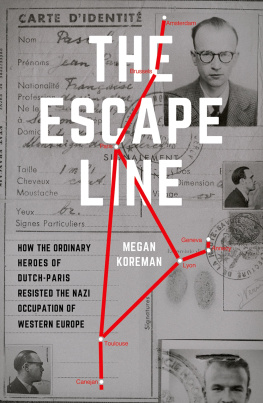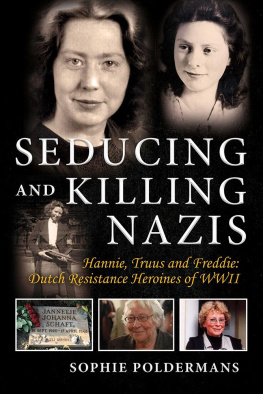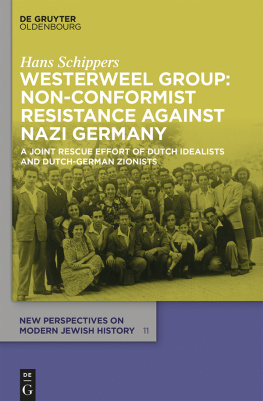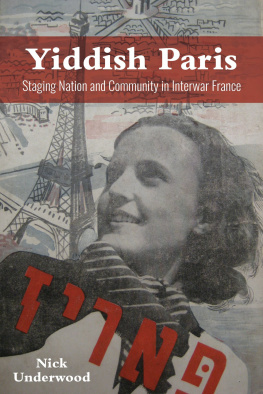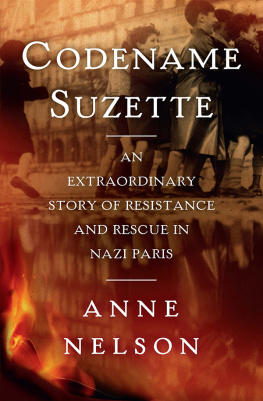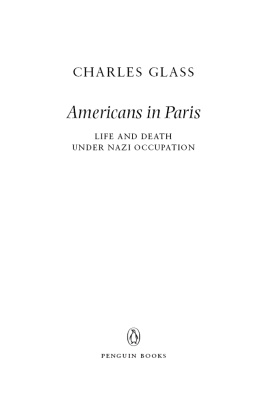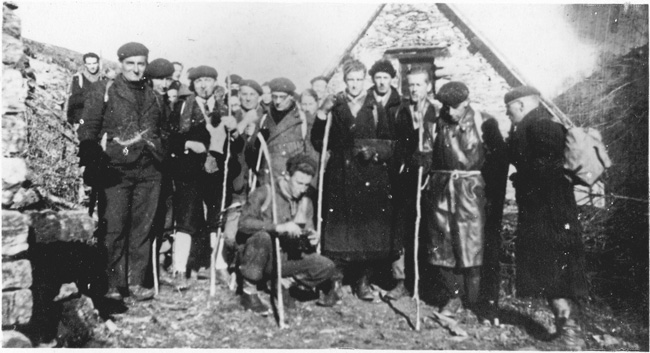
This book, like its subject, required many forms of assistance and support from many people in many places. I am grateful to them all, especially to those listed below.
Both the escape line and the book needed financing. My thanks to the Weidner Foundation and the Prins Bernhard Cultuurfonds for generously funding the research and part of the writing of the book. Half of the proceeds will go toward the Weidner Foundations mission of encouraging others to act in the spirit of altruism that illuminated John Henry Weidner and his colleagues in Dutch-Paris. Particular thanks go to Kurt Ganter, who has believed in this book since before I ever heard of Dutch-Paris. I would also like to thank Elaine Bedel, Bill Ervin, Larry Geraty, Joe Matar, Steve Morgan, and Naomi Weidner for their support.
The Weidner Foundation wishes to recognize the generous contributions of the following: Charles Bartelings, Bert and Eliane Beach, Norman Beaupre, Elaine Bedel, Beit Chaim Chabad Center of Lexington, Roy Branson, Janet Holmes Carper, Dale Brown, Paul and Kathleen Caubo, Mr. and Mrs. J. H. Caubo, Jerry and Phalia Louder, Ramona Richli Clark, Glenn Coe, Henry Coil, Maarten and Wilhelmine Eliasar, William and Joan Ervin, Dr. and Mrs. Norman Farley, Kurt and Lani Ganter, Larry and Gillian Geraty, the Lowell and Harriet Glazer Family Foundation, Michael Goldware, Reynir Gudmundsson and Lourdes Morales-Gudmundsson, Amy Harrison, Tomas Heyer, Hielke Hijmans, Willy Hijmans, Solomon and Rebecca Kaspin, Sylvan Katz, Daniel and Elissa Kido, Ed and Beverly Krick, Marcella Langhout, Maria Matar, Frank Mazzaglia, Jan Webb McQuistan, Leon M. Mordoh, Mr. and Mrs. Stan Morrison, Ali Sahabi, The Charles and Mildred Schnurmacher Foundation, Temple Beth Shalom, H. Eric Schockman, Mark E. Silverman, Rob and Brooke Smith, Mr. and Mrs. D. Townsend, Stanley and Clare Tozeski, Lilya and John Wagner, Myron F. Wehtje, Naomi Weidner, Tom and Audrey Williams, and Pieter Rudolph Zeeman.
Although resistance and writing are often solitary efforts, neither resisters nor authors can work completely on their own. Throughout this project I have relied on the unfailing support and enthusiasm of Janet Carper and Maarten Eliasar. I cannot thank them enough for their friendship, hospitality, and never-ending willingness to guide me through the intricacies of French and Dutch. Nor can I thank Hlne Lesger enough for her friendship and perseverance in representing this book.
Prof. dr. Willy Hijmans welcomed me warmly on many trips to the Netherlands and shared his memories of his experiences in Dutch-Paris with great generosity. My thanks to him and his family for their support of my research and this book.
I have benefited greatly from the generosity of David Delfosse, who has unstintingly shared his own painstaking research on the evasion of the crew of the Sarah Jane. I am also grateful for the collegial support of Bob Moore and Sierk Plantinga.
My thanks also to Robert F. Anderson, Charles Bartelings, Jan van Borssum Buisman, Joke Folmer, Willy Hijmans, Mary Lutz, Rudy Zeeman, and Anna Zurcher. It has been an honor to talk to you about the heroism of your youth.
For sharing their families stories and photographs I am indebted to Michael Bottenheim, Mariette Bremell, Nicolas Bremell, Andr Caubo, Harry Caubo, Joseph Caubo, Maarten Eliasar, Peter Hartog, Paul Gans, Brigitte Giani, Ype Henry, Rita Goldberg, Herman Grishaver, Case Koreman, Marcella Langhout, Richard Lehmann and family, Daniel Lebouille, Marie-Jos Lebouille, Jan Naij, Marianne Senf, Gaia Son, Alain Souloumiac, Dolly Starink, Dorine Starink, Leentje van der Harst, Micheline van Lint Nieuwkerk, Chris van Oosterzee, Bep and Arie van Vliet, Ben van Vliet, Kees van Vliet, and Fred Zurcher. My thanks also to all the readers of my blog, How to Flee the Gestapo: Searching for the Dutch-Paris Escape Line (www.dutchparisblog.com).
Like everyone in Dutch-Paris, I relied on the goodwill of men and women with access to information and other necessary goods. I am grateful to the staffs of all thirty-two archives that I consulted for my research. Some archivists, however, went far beyond professional efficiency to help me. They found interesting, even uncataloged documents for me; shepherded my requests for permission to see classified documents; allowed me to work beyond normal visiting hours; and shared their own desk space with me. In the Netherlands I would like to thank Hubert Berkhout and Ren van Heijningen at the Nederlands Instituut voor Oorlogsdocumentatie; Frans van Domburg at the Stichting 4045, and Raymund Schtz at the archives of the Nederlands Rode Kruis. I am indebted to Sierk Plantinga, now retired from the Nationaal Archief, for his unfailing assistance over several years. In Belgium I would like to thank Wim de Hertogh at the Protestantse Kerk, Dirk Martin at CEGES/SOMA (Centre for Historical Research and Documentation on War and Contemporary Society), Gert de Prins at the Directie-generaal Oorlogsslachtoffers, Filip Strubbe of the Belgian Rijksarchief, and Kees Veenstra of the Nederlandsche Vereeniging. In France I wish to thank Anne-Sophie Cras of the Centre darchives diplomatiques Nantes; Guido Delameillieure at the Archives historiques de lAdventisme en Europe, section Collonges-sous-Salve; Chantal Jorro of the Centre de lhistorie de la Rsistance et de la Dportation, Lyon; and Chantal Pags and the staff of the Archives dpartementales de la Haute-Garonne. I am especially grateful for the generous and creative assistance of Capitaine S. Longuet and the staff at the Bureau Rsistance of the Service historique de la Dfense Vincennes and Pascal Hureau of the Division des Archives des Victimes des Conflits Contemporains, Service historique de la Dfense Caen. In Switzerland I could not have done my research without the personal assistance of Pierre Flckiger at the Archives dEtat de Genve. In the United States I am indebted to Stan Tozeski of the Weidner Archives, which were in Massachusetts when I read them. I am also grateful for the extra effort provided by Danielle Scott Thomas and Rachel Bauer at the Hoover Library & Archives, which now houses Weidners papers.

